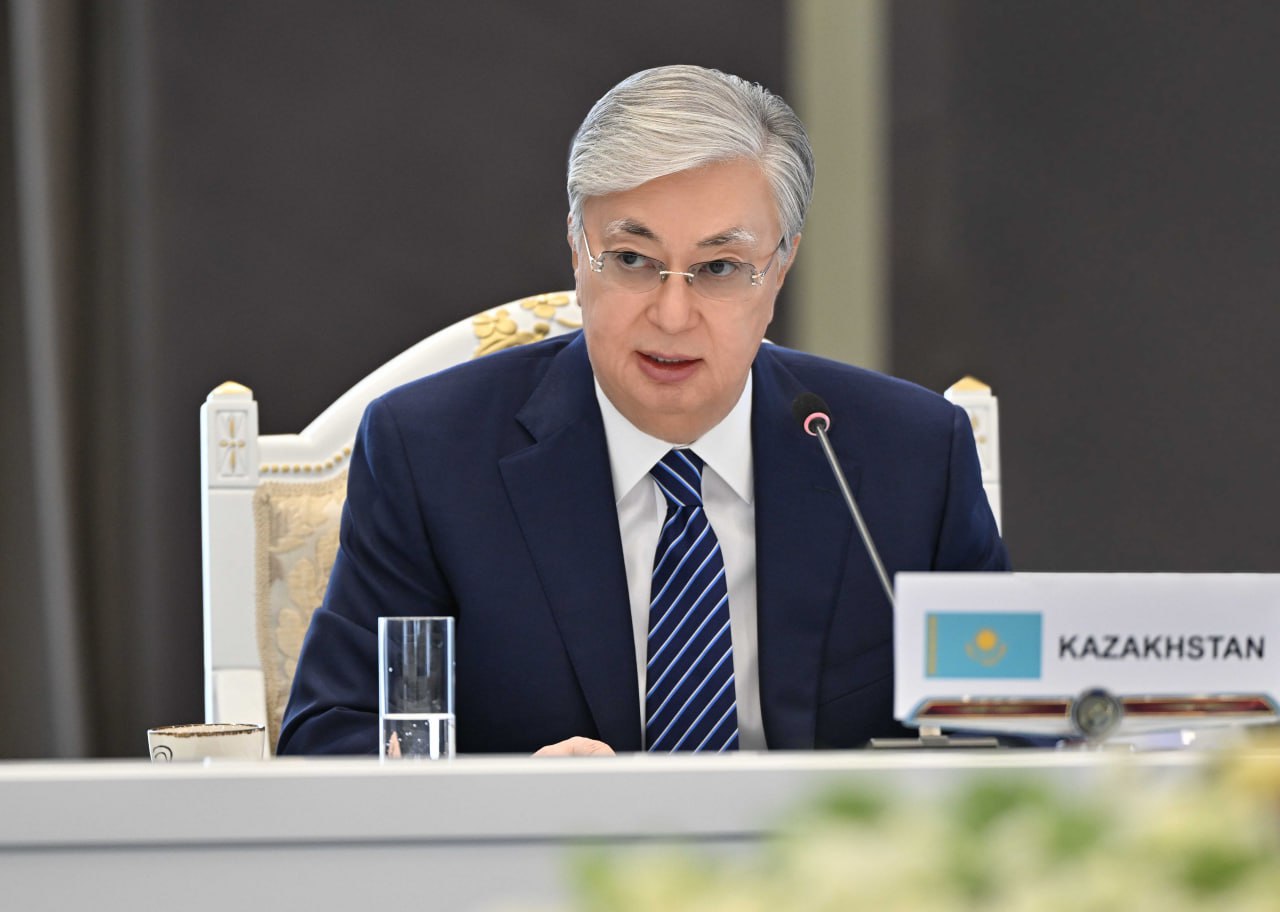ASTANA – President Kassym-Jomart Tokayev outlined strategically important priority areas of cooperation between the European Union and Central Asia during the second EU-Central Asia Summit held on June 2 in Cholpon-Ata, the Kyrgyz Republic, reported the Akorda press service.

Kassym-Jomart Tokayev at the Second EU-Central Asia Summit. Photo credit: Akorda.
Considering dynamic intra-regional economic relations, Tokayev set the goal to bring the trade turnover between Kazakhstan and Central Asian countries to $15 billion. He also stated that regional trade with EU countries increased by more than 60% to $49 billion, emphasizing the need to grow exports by broadening the trading range.
“Kazakhstan is ready to increase exports to the EU on 175 non-primary commodity items worth $2.3 billion in such areas as engineering, iron and steel production, and the food industry,” said Tokayev.
With a 35% increase in food trade between Kazakhstan and the EU to nearly $1 billion last year, Tokayev assured that the regions could significantly strengthen their food security.
Speaking about the measures to develop transport and logistics infrastructure, Tokayev noted that Central Asia is a bridge for more than 80% of overland transit traffic along the China-Europe route.
He reiterated the importance of the Trans-Caspian International Transport Route (TITR), or the Middle Corridor, which is expected to expand its potential with an annual throughput of up to 250,000-300,000 containers by 2030.
Tokayev highlighted the opportunities for European exporters through the development of reverse transit of goods along the TITR, stressing that Kazakhstan is ready to connect it with the Trans-European Transport Network (TEN-T) and the Global Gateway mega initiative.
According to the European Bank for Reconstruction and Development (EBRD), the Central Trans-Caspian Network that runs through southern Kazakhstan is considered as the “most sustainable option.” The total infrastructure investment requirements to significantly improve this network is estimated at 18.5 billion euros ($19.9 billion).
Regarding the energy sector, Tokayev noted that 80% of Kazakh oil exports to Europe are carried out through the Caspian Pipeline Consortium. The TITR also plays a vital role in this industry, as Kazakh oil has been pumped along the Aktau-Baku-Tbilisi-Ceyhan route with a volume of 1.5 million tons per year since the start of 2023.
During the same period, Kazakhstan delivered 90,000 tons of oil to Germany through the Druzhba pipeline. There is potential to bring this figure up to 1.2 million tons per year and keep increasing it in the future, Tokayev said.
Regarding gas processing capacities and the gas transmission system, the President discussed constructing the second line of the Beineu-Bozoi-Shymkent gas pipeline and a gas processing plant at the Kashagan field with a capacity of four billion cubic meters per year.
The President emphasized that a roadmap in the field of rare earth metals adopted between Kazakhstan and the EU opens up excellent prospects for the countries.
“We are ready to provide preferences to our European partners for the exploration and development of more than 60 deposits of precious and non-ferrous metals in Kazakhstan,” he said.
To achieve carbon neutrality by 2060, Kazakhstan has brought the share of renewable energy sources in the structure of the energy balance to 4.5%. Tokayev instructed to increase this indicator to 15% by 2030.
The President emphasized the need to intensify joint efforts in implementing the Global Gateway strategy and Team Europe Initiatives on climate change and water resources, the development of renewable energy sources in Central Asia, as well as the work of the International Fund for Saving the Aral Sea.
Noting the opening of Microsoft’s multi-regional hub in Kazakhstan, Tokayev revealed plans to scale up digitization initiatives and share regional experiences.
“We have set a goal to train at least 100,000 highly qualified IT specialists by 2025,” the President informed, noting that the country shows good indicators in this area.
Tokayev pointed out that Kazakhstan highly appreciates the EU’s support in promoting foreign policy initiatives and implementing large-scale democratic reforms. The sustainable development of this multifaceted partnership directly depends on security and stability in the region, including the situation in Afghanistan.
“We always assert that Central Asia is an area of peace and progress, fruitfully cooperating with all regions and countries,” the President concluded.
Tokayev met with President of the European Council Charles Michel on the summit’s sidelines, who commended the growing dynamics of cooperation between the EU and Kazakhstan.
“The EU-Kazakhstan Enhanced Partnership and Cooperation Agreement marked the beginning of a new stage of in-depth cooperation,” said Tokayev.

